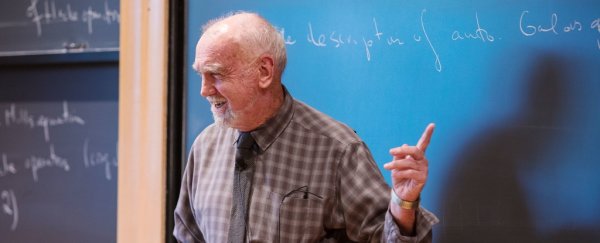One of the most prestigious prizes in mathematics is to be awarded to Canadian mathematician Robert Langlands, in recognition of a revolutionary theory that almost ended up in the trash – at its author's suggestion, no less.
Langlands, the newly announced recipient of the Abel Prize for 2018, expressed the early ideas for his 'grand unified theory of mathematics' in a 17-page letter in 1967, addressed to his French colleague, André Weil.
At the time, it seems, the 30-year-old Langlands wasn't altogether sure if his ambitious vision to draw together disparate mathematical fields – which became known as the Langlands program – was worth the paper it was written on.
"I have not had a chance to think over these questions seriously and I would not ask them except as the continuation of a casual conversation," Langlands wrote.
"If you are willing to read it as pure speculation I would appreciate that. If not – I am sure you have a waste basket handy."
As luck and history would have it, Weill was receptive to the brilliant ideas Langlands proposed: the suggestion that deep links might exist between number theory and harmonic analysis, separate areas of mathematics that researchers hadn't previously tied together.
The letter – like the vision contained within it – has circulated among mathematicians for a half-century since then, with hundreds of researchers coordinating together to explore the 'unified theory' as part of the Langlands program, which is widely considered the largest project of its kind in contemporary mathematical research.
The program, which has itself generated the theoretical underpinnings of numerous other prize-winning mathematical conjectures and theorems, singled out Langland for the Abel, which is awarded annually by the Norwegian Academy of Science and Letters.
This year, Langland beat out more than 100 other potential recipients, as judged by a five-member panel who reviewed the field.
"He's a visionary," mathematician Sun-Yung Alice Chang from Princeton University, who sat on the panel, told The New York Times.
The award will be formally presented by His Majesty King Harald V at an award ceremony in Oslo on 22 May, where Langland – who now occupies an office at Princeton that once belonged to Albert Einstein – will pick up a money prize of approximately US$775,000.
Not a bad effort for an 81-year-old legend, who once upon a time, couldn't help but doubt the grand, connective scribblings he had dreamt up.
"After I wrote it," he explained in his 1967 letter, "I realised there was hardly a statement in it of which I was certain."
Fifty years later, it seems the man has lost none of that humility.
"I do not know what to say in response to the prize," he told The Star after being informed he had won the Abel.
"I had to ask the gentleman who called to give me a half-hour to think things over."
